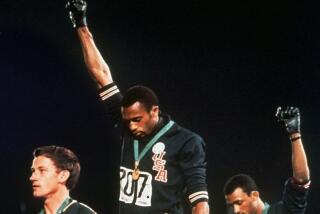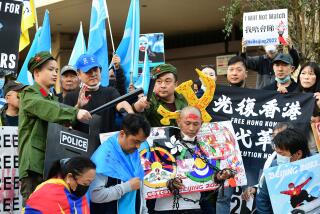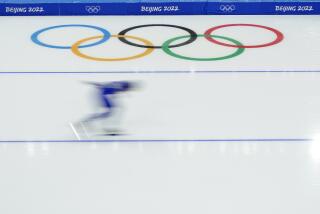Craftsman’s 16-pound Olympic boycott
- Share via
TOKYO — Masahisa Tsujitani is getting a lot of attention these days for a man who has spent much of the last 40 years bent over a lathe in a garage workshop, where amid the sharp smell of burnt oil and iron he grinds out some of the finest 16-pound shots ever tossed by Olympic athletes.
But Tsujitani’s cheerful face is showing up on Japanese television and in newspapers not because of what he does, but because of what he is refusing to do. After four Olympics in which his finely grooved iron balls were the shots of choice for most medalists, this Tokyo craftsman has told Chinese Olympic officials they will not be receiving any of his products at this summer’s Beijing Games.
“This is a personal statement about my pride as a craftsman and how my work is used,” said the fit 74-year-old, standing in his home’s low-ceilinged garage surrounded by drill bits, the detritus of shorn metal and cardboard boxes filled with polished shots.
“I feel badly for the athletes who won’t get to use my shots, but after Tibet I know I’m right,” he said last week. “Enough is enough.”
With his one-man boycott of the Games, Tsujitani has become a reluctant hero here among those unhappy with the muted response of politicians to China’s crackdown on dissent in and near Tibet. Japan’s political class has uttered barely a peep of protest, with Prime Minister Yasuo Fukuda saying only that he would “welcome talks between the concerned parties in a way acceptable to both sides.”
The Asahi newspaper dismissed that comment as “tantamount to saying nothing.”
Tsujitani is more blunt.
“Japanese politicians are wimps,” he said.
The government is squeezed between Japan’s self-image as a beacon of democratic values in Asia and its economic interests, which are entwined with China’s rise. The deep mutual economic dependency expanded despite the diplomatic freeze of recent years, when Beijing accused Tokyo of soft-pedaling its militarist past and anti-Japanese riots broke out in several Chinese cities in 2005.
Top-level relations have since thawed, even as the Japanese public remains conflicted over whether to treat China as an opportunity or a threat.
Unlike his most recent predecessors, Fukuda has been an advocate of a Beijing-friendly foreign policy, calling China an indispensable partner and nurturing the warming diplomatic mood.
No government officials were allowed to meet the Dalai Lama, Tibet’s exiled spiritual leader, during a 10-day visit to Japan last fall shortly after Fukuda took office. And diplomats here acknowledge that Fukuda is loath to take a hard line over Tibet ahead of Chinese President Hu Jintao’s arrival next month for a summit that Tokyo is eager to see go off without a hitch.
Yet large swaths of the Japanese public remain suspicious of their booming neighbor. The mood has only darkened in recent weeks after reports emerged of Japanese consumers being poisoned by pork dumplings imported from China. Amid allegations that the products were intentionally laced with pesticide, the food scare has become a staple of the national conversation, as consumer purchases of Chinese food imports have plunged.
Tsujitani said he had planned his Olympic boycott even before the Tibet violence. He was appalled by incidents such as the rough treatment of a visiting Japanese soccer team by Chinese fans three years ago as well as the anti-Japanese riots that many here are convinced were stoked by the government in Beijing.
Beijing’s harsh reaction last month to sometimes violent protests by Tibetans against Chinese rule merely convinced him that he’d been right all along. “I am not anti-Chinese whatsoever,” said Tsujitani, who says he’s visited China four times and has friends there.
The story of one man’s principled stand on an issue that politicians step gingerly around has struck a chord with Japanese media. TV crews have poked cameras into his workshop on a suburban Tokyo back street, and his wall calendar is filled with circles indicating more media visits.
Upstairs in his home, amid videotapes showing shot-putters winning Olympic gold in Sydney in 2000 using his shots, Tsujitani pulled out letters of support he has received from across Japan, fanning them like a hand of cards. He dealt one: “Against the Massacre Games” it says, atop a drawing of the figure of an athlete being gunned down by a Chinese firing squad.
Still, Tsujitani doesn’t want the athletes to be hurt by a boycott, and said it was a pity they won’t be able to use his shots. The politicians should stay away, he said. Not the athletes.
But though a wider boycott might have a sobering effect on the Chinese government, Tsujitani does not expect his defiance to carry much weight.
“I just wanted the Chinese government to ask themselves why one man would not send something like shots to their Olympics,” he said. “I wanted them to be embarrassed. But I doubt they’ll get it.”
--
More to Read
Go beyond the scoreboard
Get the latest on L.A.'s teams in the daily Sports Report newsletter.
You may occasionally receive promotional content from the Los Angeles Times.






